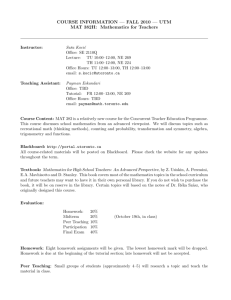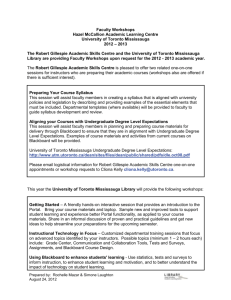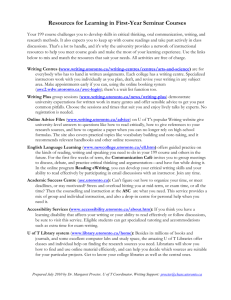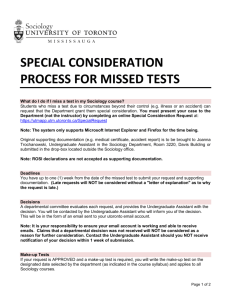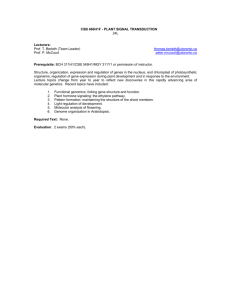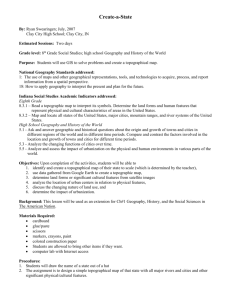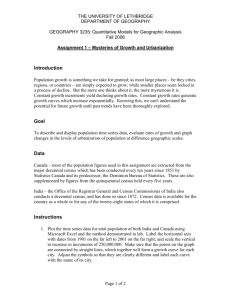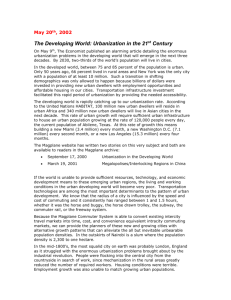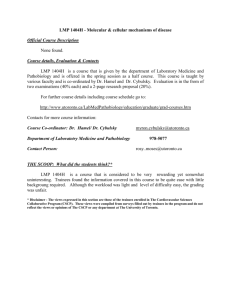GGR207 Cities, Urbanization and Uneven Development
advertisement
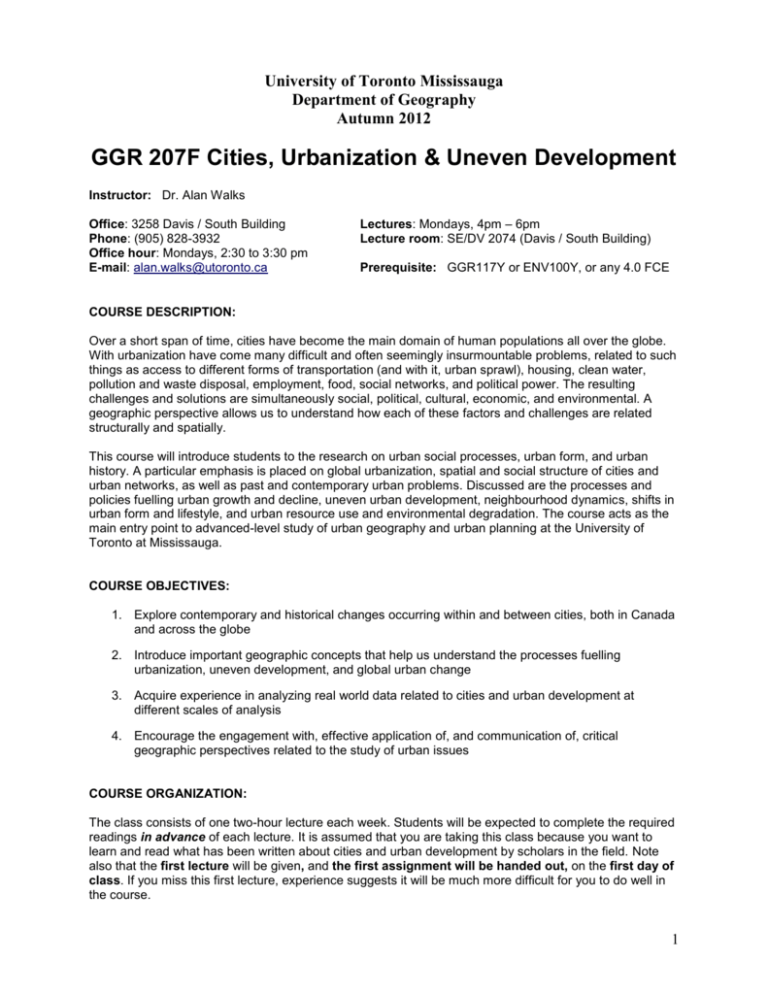
University of Toronto Mississauga Department of Geography Autumn 2012 GGR 207F Cities, Urbanization & Uneven Development Instructor: Dr. Alan Walks Office: 3258 Davis / South Building Phone: (905) 828-3932 Office hour: Mondays, 2:30 to 3:30 pm E-mail: alan.walks@utoronto.ca Lectures: Mondays, 4pm – 6pm Lecture room: SE/DV 2074 (Davis / South Building) Prerequisite: GGR117Y or ENV100Y, or any 4.0 FCE COURSE DESCRIPTION: Over a short span of time, cities have become the main domain of human populations all over the globe. With urbanization have come many difficult and often seemingly insurmountable problems, related to such things as access to different forms of transportation (and with it, urban sprawl), housing, clean water, pollution and waste disposal, employment, food, social networks, and political power. The resulting challenges and solutions are simultaneously social, political, cultural, economic, and environmental. A geographic perspective allows us to understand how each of these factors and challenges are related structurally and spatially. This course will introduce students to the research on urban social processes, urban form, and urban history. A particular emphasis is placed on global urbanization, spatial and social structure of cities and urban networks, as well as past and contemporary urban problems. Discussed are the processes and policies fuelling urban growth and decline, uneven urban development, neighbourhood dynamics, shifts in urban form and lifestyle, and urban resource use and environmental degradation. The course acts as the main entry point to advanced-level study of urban geography and urban planning at the University of Toronto at Mississauga. COURSE OBJECTIVES: 1. Explore contemporary and historical changes occurring within and between cities, both in Canada and across the globe 2. Introduce important geographic concepts that help us understand the processes fuelling urbanization, uneven development, and global urban change 3. Acquire experience in analyzing real world data related to cities and urban development at different scales of analysis 4. Encourage the engagement with, effective application of, and communication of, critical geographic perspectives related to the study of urban issues COURSE ORGANIZATION: The class consists of one two-hour lecture each week. Students will be expected to complete the required readings in advance of each lecture. It is assumed that you are taking this class because you want to learn and read what has been written about cities and urban development by scholars in the field. Note also that the first lecture will be given, and the first assignment will be handed out, on the first day of class. If you miss this first lecture, experience suggests it will be much more difficult for you to do well in the course. 1 ASSIGNMENTS There are two written assignments, a mid-term test, a spot quiz, and a final exam required for this course. The assignments are to be handed in to the GGR207 drop box located in the department of Geography by 4pm on the due date. They are NOT to be handed in during the lecture/ in class. This course will not be using Turnitin.com for the purposes of submitting assignments. Assignments submitted by the due date, and mid-term tests taken on the scheduled date, will be graded and returned in class on the return dates listed. GRADING The grading scheme is as follows: 15% 5% 20% 15% 45% Assignment 1 Spot Quiz Mid-Term Test Assignment 2 Final Exam Due Tuesday October 2 (returned Oct. 15) could happen in any lecture! Monday October 22 (returned Nov. 5) Due Tuesday November 27 during exam period (Dec. 10 - 21) TEXTBOOK There are two required textbooks for this course: 1. Pacione, M. (2009). Urban Geography: A Global Perspective. London: Routledge. 2. Bunting, T.E. and Filion, P. (2010) Canadian Cities in Transition, 4th Edition Toronto: Oxford University Press. (Note: it is important to get the 4th edition as it is considerably different from previous editions) Additional resources will be drawn from the following (note: will be on reserve in the UTM library): 3. Yeates, M. (1998) The North American City (5th edition). New York: Longman. GEOGRAPHY LATE ASSIGNMENT/ MISSED WORK/TEST POLICY IN-CLASS TESTS: Students CANNOT petition to re-write a test once the test/quiz has begun. If you are feeling ill, please leave the room before starting your test/quiz and seek medical attention immediately. You must have a physician fill out a U of T Student Medical Certificate and submit a request via the online Special Consideration Request form @ https://endor.utm.utoronto.ca/SpecialRequest/ within 24 hours. MISSED TERM WORK (Assignment/Lab – as per Department of Geography policy): Late assignments will be subject to a late penalty of 10% per day (including weekends) of the total marks for the assignment. Assignments submitted five calendar days beyond the due date will be assigned a grade of zero. Academic accommodation can be made when an assignment is late or a student is unable to write a term test/quiz for University. MISSED TERM TEST (Quiz/Test – as per Department of Geography policy): In courses with final exams, there will be no re-writes or make-ups for term tests/quizes missed for University-accepted, verifiable reasons. Instead, the final exam will be re-weighted by the value of the term test/quiz. Informing Your Professor and Submitting Appropriate Documentation (3 steps): 1. The following steps must be completed in order to be considered for academic accommodation for any course work such as missed tests or late assignments: 2. Students must inform their professor in writing (e-mail is acceptable) within 24 hours of a test date/assignment due date of any circumstances that prevent them from writing a test or submitting an assignment on time. 2 3. Students who miss a test due to circumstances beyond their control (e.g. illness or an accident) can request that the Department grant them special consideration. You must present your case to the Department (not the Instructor) by completing an online Special Consideration Request @ https://endor.utm.utoronto.ca/SpecialRequest/. Note: The system only supports Microsoft Internet Explorer and Firefox for the time being. Original supporting documentation (e.g. a medical certificate, accident report) MUST BE SUBMITTED to the DROP BOX (labeled “Environment and Geography Petition Documentation”) located outside Room 3282, Davis Building. Note: ROSI declarations are not accepted as supporting documentation. You have up to one (1) week from the date of the missed test to submit your request and supporting documentation (late requests will NOT be considered without a "letter of explanation" as to why the request is late). Medical Certificates or Doctor's Notes MUST include the statement "This Student was unable to write the test on date(s) for medical reasons". Documentation MUST show that the physician was consulted within ONE day of the test date. A statement merely confirming a report of illness made by the student is NOT acceptable (such as, “This patient tells me that he was feeling ill on that day.”). Please note that the written explanation and documentation that you submit represents an appeal from you, requesting the opportunity to account for that portion of your grade in some other manner. If an appeal is not received, or if the appeal is deemed unacceptable, you will receive a grade of zero for the item you missed. If the appeal is granted – that is, your reason for missing the item is considered acceptable by the committee – then a mechanism for accounting for the grade value of the missed item will be discussed. A Departmental committee evaluates each request. Decisions will be communicated by email within two weeks of receipt of all completed documents. Note: It is your responsibility to ensure your email account is working and able to receive emails. Claims that a Departmental decision was not received will NOT be considered as a reason for further consideration. Contact Sabrina Ferrari (sabrina.ferrari@utoronto.ca) Academic Counselor, should you NOT receive notification of your decision within 2 weeks of submission. Note that holidays and pre-purchased plane tickets, family plans (unless critical, such as death of an immediate family member), your friend’s wedding, lack of preparation, or too many other tests are not acceptable excuses for missing a quiz, a test, or an item of term work. EXTENSION OF TIME Students MUST submit a request for extension in ADVANCE of the deadline in order to receive a decision. If you require more time to complete an assignment you will be required to make your request directly to the Department by completing an on-line Special Consideration Request @ https://endor.utm.utoronto.ca/SpecialRequest/ You will be required to provide supporting documentation. Original supporting documentation (e.g. a medical certificate, accident report, etc) MUST BE SUBMITTED to the DROP BOX (labeled “Environment and Geography Petition Documentation”) located outside Room 3282, Davis Building. Note: ROSI declarations are not accepted as supporting documentation. You are expected to submit your request to the Department before the due date of the assignment, unless demonstrably serious reasons prevent you from doing so. In the event of an illness, if you are seeking a one-day extension, medical certificates or doctor’s notes must confirm that you were ill on the due date of the assignment; if you are requesting a longer extension, your documentation must specify exactly the length of the period during which you were unable to carry out your academic work. For extensions of time beyond the examination period you must submit a petition through the Office of the Registrar. http://www.erin.utoronto.ca/index.php?id=6988 A Departmental committee evaluates each request for an extension of time. Decisions will be communicated by email within two weeks of receipt of all completed documents. Please note that students are required to submit their assignment/lab as soon as they are able and they should NOT wait for the decision of the committee. Note: It is your responsibility to ensure your email account is working and able to receive emails. Claims that a Departmental decision was not received will NOT be 3 considered as a reason for further consideration. Contact Sabrina Ferrari (sabrina.ferrari@utoronto.ca) Academic Counsellor, should you NOT receive notification of your decision within 2 weeks of submission. It is your responsibility to follow the appropriate procedures and submit requests for special consideration on time. Failure to do so may result in the committee denying your request. Should you require further information regarding Special Considerations, please contact the Academic Counselor, Sabrina Ferrari Undergraduate Academic Counselor Room 3282, Davis Building, Telephone: 905-828-5465 email: sabrina.ferrari@utoronto.ca ACADEMIC INTEGRITY AND HONESTY, AND ACADEMIC OFFENCES It is your responsibility as a student at the University of Toronto to familiarize yourself with, and adhere to, both the Code of Student Conduct and the Code of Behaviour on Academic Matters. This means, first and foremost, that you should read them carefully. The Code of Student Conduct is available from the U of T Mississauga website (Registrar > Academic Calendar > Codes and Policies) or in your print version of the Academic Calendar. The Code of Behaviour on Academic Matters is available from the U of T Mississauga website (Registrar > Academic Calendar > Codes and Policies) or in your print version of the Academic Calendar. Another helpful document that you should read is How Not to Plagiarize, by M. Proctor. ACCESSIBILITY U of T Mississauga and the AccessAbility Resource Centre are committed to the full participation of students with disabilities in all aspects of campus life. The AccessAbility Resource Centre provides academic accommodations and services to students who have a physical, sensory, or learning disability, mental health condition, acquired brain injury, or chronic health condition, be it visible or hidden. Students who have temporary disabilities (e.g., broken dominant arm) are also eligible to receive services. All interested students must have an intake interview with an advisor to discuss their individual needs. Students who require accommodation are advised to visit the AccessAbility Resource Centre as early as possible to have their needs assessed, as it may take some time to process the application. For more information please contact the centre at: Room 2047, South Bldg. Tel/TTY: 905-569-4699 E-mail: access.utm@utoronto.ca Web: www.utm.utoronto.ca/access Any student requiring accommodation must be registered in advance with the AccessAbility Resource Centre. E-MAIL COMMUNICATION Always use your University of Toronto e-mail address (…@mail.utoronto.ca) for all course-related communications. Other e-mail addresses may be filtered as spam and we do not promise to respond to them. Please include the course code (e.g., GGR207F) as part of your subject line, and include your full name and student number in the body of the e-mail. Please read the course handouts and check the course Blackboard site before e-mailing a question, to make sure that it hasn’t already been answered. You should only contact Dr. Walks with questions about the assignments or the course. The best way to contact Dr. Walks is in person during office hours, or via email if this is not possible (see above). Note that, as per the departmental policy regarding missed term work above, the first person that you should e-mail concerning department- or program-related queries or to submit documentation regarding a missed test or assignments is the Academic Counsellour for Geography/Environment, Sabrina Ferrari (sabrina.ferrari@utoronto.ca). 4 EXPECTATIONS REGARDING BEHAVIOUR IN THE ACADEMIC SETTING The university’s expectation of you is that you will show respect to the Course Instructor, TAs, other faculty, staff, and fellow students. This includes arriving on time and staying for the entire class (so you don’t disturb others by your late entry or early departure); listening quietly (so you don’t disturb others by chatting or online activities); approaching your course work with an open, honest spirit and enthusiasm; and otherwise adhering to the Student Code of Conduct and the Code of Behaviour on Academic Matters (as discussed above). In turn, you can expect the Course Instructor, staff, and TAs to show respect to you and your fellow students; to deliver the best course that they possibly can; to communicate their enthusiasm for the material; to maintain fairness in all aspects of course delivery and assessment; and otherwise to adhere to the University’s Code of Behaviour on Academic Matters. QUERYING OR CHALLENGING A MARK Please note that, according to UTM policy, you have one month from the date an item is returned to you, during which time you may query the mark or submit the item for remarking. Contact Dr. Walks for all queries about course marks, or if you wish to challenge a mark. Absolutely no item will be remarked more the one-month after an assignment or test has been returned. Please note that you must wait one week from the time the assignment is returned before requesting that it be considered for remarking. Material submitted for remarking must be accompanied by a brief written explanation detailing your reasons for dissatisfaction with the original mark (such as an addition error, or something you think the marker may have missed). Note that the item may be returned first to the TA who originally marked it. If so, and if you are still dissatisfied, it may then be passed on to the Course Instructor for reconsideration. This is the prerogative of the Course Instructor. POLICY ON RELIGIOUS OBSERVANCES It is the University's policy to make every effort to accommodate students, staff and faculty who observe religious Holy Days, and to arrange reasonable accommodation of the needs of students who observe religious holy days other than those already accommodated by ordinary scheduling and statutory holidays. Students have a responsibility to alert members of the teaching staff in a timely fashion to upcoming religious observances and anticipated absences. Instructors will make every reasonable effort to avoid scheduling tests, examinations or other compulsory activities at these times. If compulsory activities are unavoidable, every reasonable opportunity will be given to these students to make up work that they miss, particularly in courses involving laboratory work. When the scheduling of tests or examinations cannot be avoided, students will be informed of the procedure to be followed to arrange to write at an alternate time. It is most important that no student be seriously disadvantaged because of her or his religious observances. However, in the scheduling of academic and other activities, it is also important to ensure that the accommodation of one group does not seriously disadvantage other groups within the University community. More information and some dates of potential relevance for the U of T community are available at www.viceprovoststudents.utoronto.ca/publicationsandpolicies/guidelines/religiousobservances.htm. 5 GGR 207F Cities, Urbanization and Uneven Development Autumn 2012, University of Toronto at Mississauga OUTLINE OF LECTURE TOPICS AND READING SCHEDULE 1. Defining the City - The problems posed by global urbanization Defining scope, nature, and problematic of cities and urban areas Spatial scales of analysis Intro to the Canadian city Required Reading: Pacione Chapter 2 (except pages 26-30) Reading: B + F Chapter 1 2. The Urbanization Process - Concepts, definitions and measurement Urbanization and economic development Alternative perspectives on, and approaches to, the urban process Counter-urbanization, suburbanization, exurbanization, metropolitanization Required Reading: Pacione Chapter 4 pages 68-78 (Recommended Reading: Pacione Chapter 5) 3. The Origins and Forms of Cities - The earliest settlements and the growth of cities - Enabling factors in urbanization, agglomeration economies - The forms and internal structure of Medieval, Pre-Industrial, and Industrial Cities Required Reading: Pacione Chapter 3 4. The Urban System - Evolution and types of urban systems City size distributions, hierarchies, dominance, uneven growth Regional differences in urbanization and urban systems The core-periphery structure of the Canadian urban system Required Reading: Pacione Chapter 4 pages 78-92; Chapter 6 pages 121-124 and 130-136 (Recommended reading: Yeates Chapters 3 and 4) 5. The Growth and Functions of Cities - Cities as manufacturing centres and service centres, industrial location theory - Central Place Theory - The creative and knowledge-based economy of cities Required Readings: Pacione Chapter 6 pages 122 -130 B + F Chapter 6 (Vinodrai) Yeates, Chapters 5 and 6 (Recommended reading: B + F Chapter 7 (Hutton) pages 110 – 118) 6 6. Cities in the Global Economy: Globalization and De-Industrialization - Urban Economic Restructuring under Globalisation World/ Global Cities The ‘Dependent’ City Deindustrialization and Urban Decline Required Readings: Pacione Chapter 14 B + F Chapter 16 (Donald and Hall) 7. Urban Migration, Interaction, and Immigration - Mobility, Migration and Immigration Flows of Goods, Services, Information, Capital Immigration and the City Required Reading: 8. Internal City Structure, Spatial Form, and Development - Ecological and economic models of urban structure Land use, planning, and urban transportation Major actors in the production of the built environment Changes in urban form in Canadian cities Required Reading: 9. Pacione Chapter 23 B + F Chapter 8 (Townshend and Walker) pages 131-141 (Recommended reading: B + F Chapter 9 (Hoernig and Zhuang) Pacione Chapter 7 B + F Chapter 2 (Bunting and Filion) (Recommended Reading: Pacione Chapter 15, B + F Chapter 13) Third World Urbanization - Colonial and Post-Colonial Urbanization Theories of (Third World) Development and Urbanization Problems of Development, Poverty, and Housing in Third World Cities Required Reading: Pacione, Chapters 21, 24, 25 10. Cities and the Environment: The Future of Cities? - The environmental and economic vulnerability of cities The urban ecological footprint Food production, the environment, and sustainability Required Readings: B + F Chapter 5 (Rees) Pacione, Chapter 30 7
